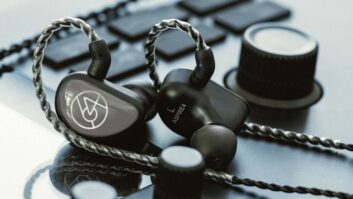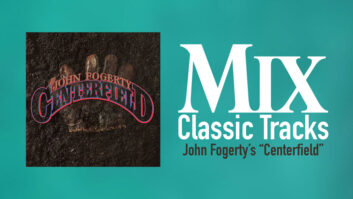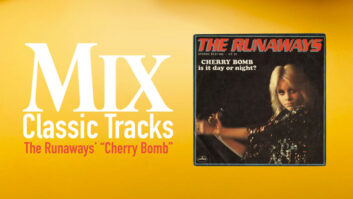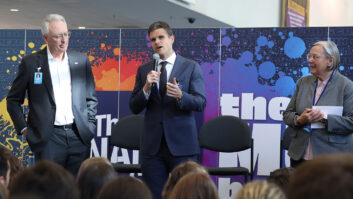Dimitri Tikovoi, co-producer/engineer/musician, worked with Marianne Faithfull on her new album, Give My Love to London. LONDON, UK—Marianne Faithfull has just released a new album, Give My Love to London, marking the fiftieth anniversary of a music career that began with a hit single—“As Tears Go By,” one of the first songs written by Mick Jagger and Keith Richards—at the age of 16. Recorded in London, this latest album features collaboration with Nick Cave, Roger Waters, Steve Earle, Ed Harcourt, Anna Calvi, Tom McRae, Patrick Leonard and others, was mixed by Flood, and was co-produced by Rob Ellis and Dimitri Tikovoi.

“Instead of doing all of the arrangements and getting Marianne to sing at the end, I thought it would be better to start with basic piano and vocal and then do all the arrangements around her voice,” says Tikovoi. The award-winning, multi-million-selling, Parisian-born producer, multi-instrumentalist, songwriter and DJ has previously worked with Placebo, The Horrors, John Cale, Gold-frapp and numerous others.
Tracking for the project, Faithfull’s twentieth album, began at the private Miloco Hoxa Studio on Kilburn Lane. “We were trying to find a studio that wasn’t too much of a commercial studio, something that had a bit more of a vibe,” explains Tikovoi. “The control room and the live room are in the same space; there’s no separation. I wanted her to feel like she was in a lounge more than in a studio.”
The entire process was very organic, he reports. “We started with two or three weeks in the studio, and did a song a day. We would build the track a little bit before she came to the studio, so she’d have something to sing over. Then, after she’d left, we’d put all the arrangement and all the ideas on top of the track. After that we took a little break, then went back and did some more arrangements, strings, guests and stuff like that.”
Tikovoi and Ellis divided the production tasks between themselves: “We started working on the pre-production separately, and then we met in the studio and worked on the arrangements together. I get more involved in the engineering/arrangement side and Rob gets more involved with the vocal, looking after Marianne’s lyrics and singing. But at the same time, Rob ended up writing the string arrangements, and it kind of melted together. It was really, really nice working together.”
The pair also played on the album. “Rob played drums on quite a few tracks. I ended up playing the bass on all of the tracks,” says Tikovoi, who also contributed percussion and other instruments, and co-wrote a track, “True Lies,” with Faithfull. The musicians also included Portishead’s Adrian Uttley on guitar, Nick Cave collaborator Warren Ellis on violin and Harcourt on keyboards. “For all the basic takes, drums, piano, bass and guitar were done together,” he adds. “Then we did some guitar, string and piano overdubs.”
Everything was tracked to tape, then sent to Pro Tools, he continues. “For Marianne’s vocal, we went to Pro Tools first and then did three generations of tape—we went back onto the Studer two or three times, depending on the song. We tried to get more compression out of the tapes, because everything was recorded without compression.”
Working to tape was as much about the creative focus as the sound quality: “The psychology of it is very different than working with Pro Tools. You’re just trying to get a really solid take and you’re trying to get the vibe. And just the fact that you rewind the tape, you’ve got a little bit of time to think; you listen to it differently. I thought, for Marianne, it would be a really good idea to do that.” Plus, says Tikovoi, “Just the simple fact that you’re using your ears to listen to music. You’re not using your eyes to see what you’ve recorded. I think it’s a very different thing.”
The choice of vocal mic was also critical to the process as much as the sound. “I wanted her to record without headphones, because I didn’t want her to be isolated. We were all in the same room with her, so we could speak to each other. We tried different microphones and ended up choosing a Shure SM7 so we could record with the speakers quite loud. Especially with the kind of album we were trying to do, a bit of bleed was part of the vibe and the charm of the album. There is some music on the vocal takes, but for Marianne, it made her sing quite differently. For someone like Marianne, it’s all about the connection, the performance.”
The album was mixed on the Neve V60 at Assault & Battery 2, a joint venture between Flood, Alan Moulder and Miloco. “Flood doesn’t think like a mixing engineer; he thinks like a producer,” says Tikovoi. “He’s not worried about making things sound good; he’s focused on getting the feeling right, which was what we were after for the album. It just pushed the envelope a little bit further.”
Flood had earlier visited the tracking session. “He was already suggesting ways that he was going to mix the tracks. It made things a little more radical as we started changing a few things, thinking of the way he was going to mix. It was all very interactive as an album.”
Dimitri Tikovoi
dimitritikovoi.com
Miloco
www.miloco.co.uk







